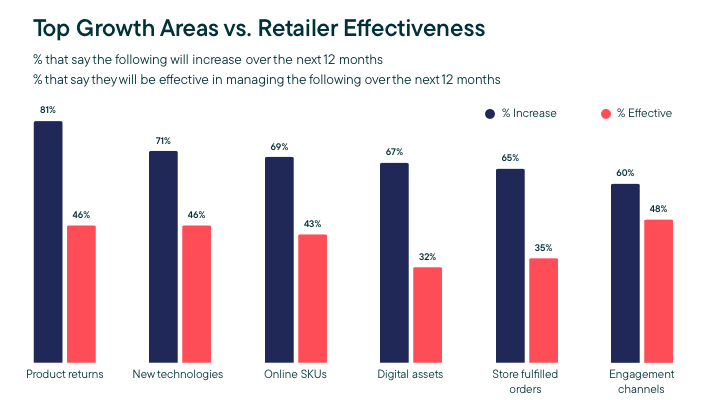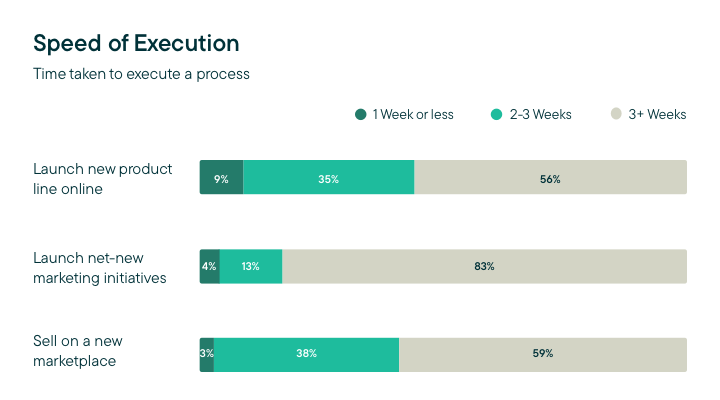In an effort to help retailers manage the rapidly increasing digital complexity both online and in-store, Incisiv, an industry insights firm, conducted a survey titled “Digital Complexity: Thriving in Unpredictable Times” in collaboration with Commercetools, Contentstack, and FluentCommerce.
Gaurav Pant, chief insights officer at Incisiv, hosted a webinar with Michael Scholz, Nicolla Kinsella, and Jasmin Guthmann to discuss the survey results, providing valuable insights and direction to help retailers effectively navigate the unpredictable current environment. Consequently, both the survey and the webinar shed light on the need for retailers to adapt to the changing digital landscape in order to succeed, thus showing how important collaboration is in order to thrive in unpredictable times.
The pandemic has sparked remarkable growth in digital sales, ranging from three-fold to five-fold, resulting in a manifold increase in digital complexity. Unfortunately, only a few retailers have been able to effectively scale their capabilities for the next disruption. For instance, while 81 per cent of executives believe product returns are a top growth area, only 46 per cent feel they can manage this surge. Similarly, a gap of 35 per cent exists between expected digital asset growth and management effectiveness. Although the disparity is less acute for other items, the void across key growth areas remains concerning nonetheless.

According to Contentstack’s Jasmin Guthmann, the growth in digital assets far exceeds the capacity for extra staff to manage them. This trend was further supported by a survey from Fluent Commerce which found that 66 per cent of customers in the US and UK, 68 per cent in Germany, and 71 per cent in Australia check inventory before going to the store. This creates a gap between the growth areas and effective management and can lead to costly problems such as advertising for items that are out of stock, resulting in an unsatisfied customer. Consequently, retailers must be proactive in order to bridge this gap and ensure a seamless and personalised shopping experience.
Alarmingly, a survey has revealed that the technologies and processes required for retailers to stay competitive are not up to par: 42 per cent reported their product catalogue system inadequate and 39 per cent found their store fulfilment platform unsuitable. Consequently, launching a new product line digitally or a new marketing initiative can take over three weeks – far too slow for today’s commerce world. That means retailers must take action to address this challenge and ensure they have the necessary technologies in place. Furthermore, when customers become dissatisfied and leave bad reviews, it can have a detrimental effect on customer service and many other areas.

In response to this, Michael Scholz highlighted the importance of having a robust commerce engine in the background, so that businesses can be ready to adapt to any new channels that emerge, such as Instagram, TikTok, and shoppable TV. He urged retailers to prepare for whatever life throws at them.
The discussion eventually shifted to the highly anticipated composable commerce technology, which Scholz highlighted for its immense flexibility and agility in allowing retailers to take advantage of ever-changing market conditions. To successfully scale digital commerce, he suggested “starting small, testing and failing fast” to effectively manage change, in addition to leveraging cloud-native solutions to manage seasonal events such as Black Friday and employing a unified commerce engine to manage commerce functions across different frontends.
Retailers have questioned the complexity of implementing composable commerce, but Guthmann convincingly argued that it is not as difficult as it may seem. Furthermore, when considering the flexibility, agility, scalability, and low total cost of ownership (TCO) it provides, it is clear that retailers should leverage composable commerce in 2023 – a point that was unanimously agreed upon.
Download the research study with all insights and watch the webinar to get a complete picture of the findings.






